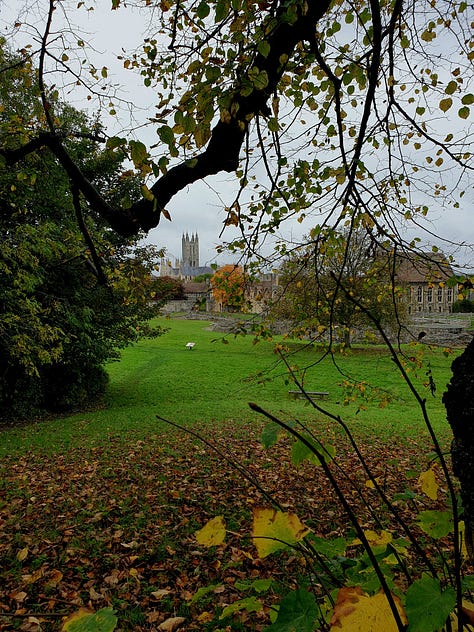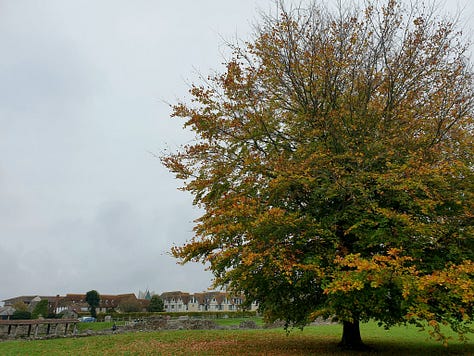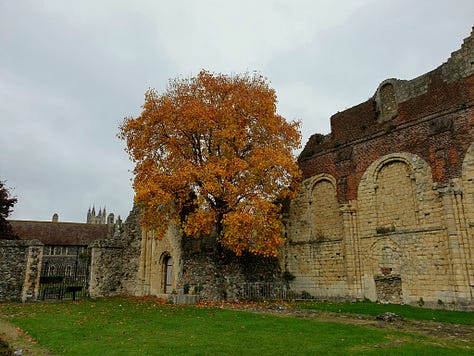The Ragged Optimist 28
Double feature. AI Special.
I’m writing this surrounded by cardboard boxes, dismantled furniture, and the debris of moving (I go next week). Lots of 7” singles, hundreds of books, more teapots than I really need, and a frankly surprising amount of pencils.
And this week, amidst the muddle, I’ve got meetings to kick off new projects - developing a cultural strategy, writing a funding bid for a Roman Villa, looking at lottery funds for a local project. And applying to university.
So I’m looking forward to new beginnings, fresh challenges. If you’re making plans for adventures you’d like me to be part of, get in touch.



This is from a Joseph Rowntree Foundation on ‘collective imagination’. "Albert Einstein put it, ‘we cannot solve our problems with the same thinking we used when we created them.’ This is easier said than done. For most of the past century, particularly in the western world, we have promoted mindsets valuing what we know over what we have the capacity to imagine. We have built education systems, businesses, economies and societies based on what we can measure, evidence, and rationalise, over what we can dream of, create, wonder, or hope for."
And this, "If we’re going to change the world, the first thing you have to be able to do is imagine a better world. And that imagination is what we let happen”, is from … er... Dan Thompson in The Guardian. Seems I'm a Collective Imagination Practitioner. Who knew? Not me.
In 2018, conservation groups petitioned Hamburg to preserve its green space after the mayor pledged to build 10,000 flats in the pricey port each year. The authorities signed a contract with the citizen’s initiative to protect 30% of Hamburg’s land area – 10% as untouchable nature reserves and 20% with a looser conservation status – and ensure the share of public green space in the city rises over time.
Egypt has been certified malaria-free by the World Health Organization - an achievement hailed by the UN public health agency as "truly historic".
In California, the Migratory Bird Conservation Partnership are using a variety of tactics to increase the number of sites migrating birds need - including creating temporary flooded landscapes. Pop up migratory routes.
I offered my studio in Margate a couple of weeks ago. Now Bernadine Evaristo is offering her spare house in Ramsgate to writers. (Oh - and if anyone else has got a spare house in Ramsgate, get in touch!)
The North Atlantic Transmission One Link aims to deliver high-voltage direct current subsea cables across the Atlantic to link clean energy between North America and Western Europe. This would be particularly helpful across time zones: as the world turns, solar from Europe’s day could help power America’s early-morning darkness, then solar from America’s day could help power Europe’s twilight, ensuring consistent carbon-free power.
The Riverlands project at Porlock Vale on Exmoor is reverting river courses to their natural path. A year on from the launch and there are benefits for nature and wildlife - seven hectares of new waterscapes and wetlands—vital for slowing water flow, storing carbon, and providing homes for wildlife. Beavers and water voles are being re-introduced.
A two-year project across three counties has uncovered more than 3271 acres of previously unknown ancient woodland. These are woods that have persisted since 1600, packed with a range of forest-loving plant life, fungi, insects and micro-organisms.
A Roman statue in almost-mint condition has been discovered in Varna, the Bulgarian city’s Regional History Museum said.
Weeds? No such thing. British native plants, mate. There’s a new ‘Weed garden’ at the University of Oxford site Begbroke Science Park, designed by Sarah Alun-Jones.
And if all that good news, hope, and optimism isn’t enough - this week is our monthly First Friday at Marine Studios, Margate. We’ll be looking at AI, and trying to find the positives. From 6pm, free admission. So - here as a bonus are some Raggedly Optimistic AI stories for you (thanks Connor!).
After a rare neurological disorder robbed her of her ability to speak clearly, Wexton has been given her voice back with the help of a powerful artificial intelligence program, allowing the US politician to make a clone of her speaking voice using old recordings of speeches and appearances she made as a congresswoman.
On March 29th, 2022, an enigmatic tweet appeared from the Volstof Institute for Interdimensional Research, followed by eerie images of a forgotten lab filled with organic horrors pushing through from another dimension. This was the beginning of an experiment using AI art to flesh out a mix of cosmic horror and alt-history science fiction.
Founded in 2019 by Richard Robinson, a black corporate lawyer, Robin AI was developed from his personal experience in the legal industry and with a passion to improve it.
A team managed to build a device that could identify even the most subtle differences in baked goods by taking a photo of the pastry and analyzing its features. They called it BakeryScan. Turns out that BakeryScan can detect a cancerous cell under a microscope with 98% accuracy, and allows technicians to review up to four times as many cases per day.
StorySign is an AR app created to help deaf children open up the world of books.
For almost 2000 years, a library was buried underground under 20 meters of volcanic mud. In the 1700s, they were excavated, and while they were in some ways preserved by the eruption, they were so fragile that they would turn to dust if mishandled. How do you read a scroll you can’t open?
A robotic glove is lending a hand (lending a hand - geddit?) and providing hope to piano players who have suffered a disabling stroke. The soft robotic hand exoskeleton uses artificial intelligence to improve hand dexterity.
Wildbook uses neural networks and computer-vision algorithms to detect and count animals in images, and to identify individual animals within a species. This information enables more precise estimates of wildlife population sizes.
Artificial intelligence might save the LA water supply from a big earthquake.
And finally - AI can accurately identify individual beavers by the pattern of scales on their tails, a bit like human fingerprints. Double-beaver this week. I spoil you.


Excellent article Dan and lots of food for thought!